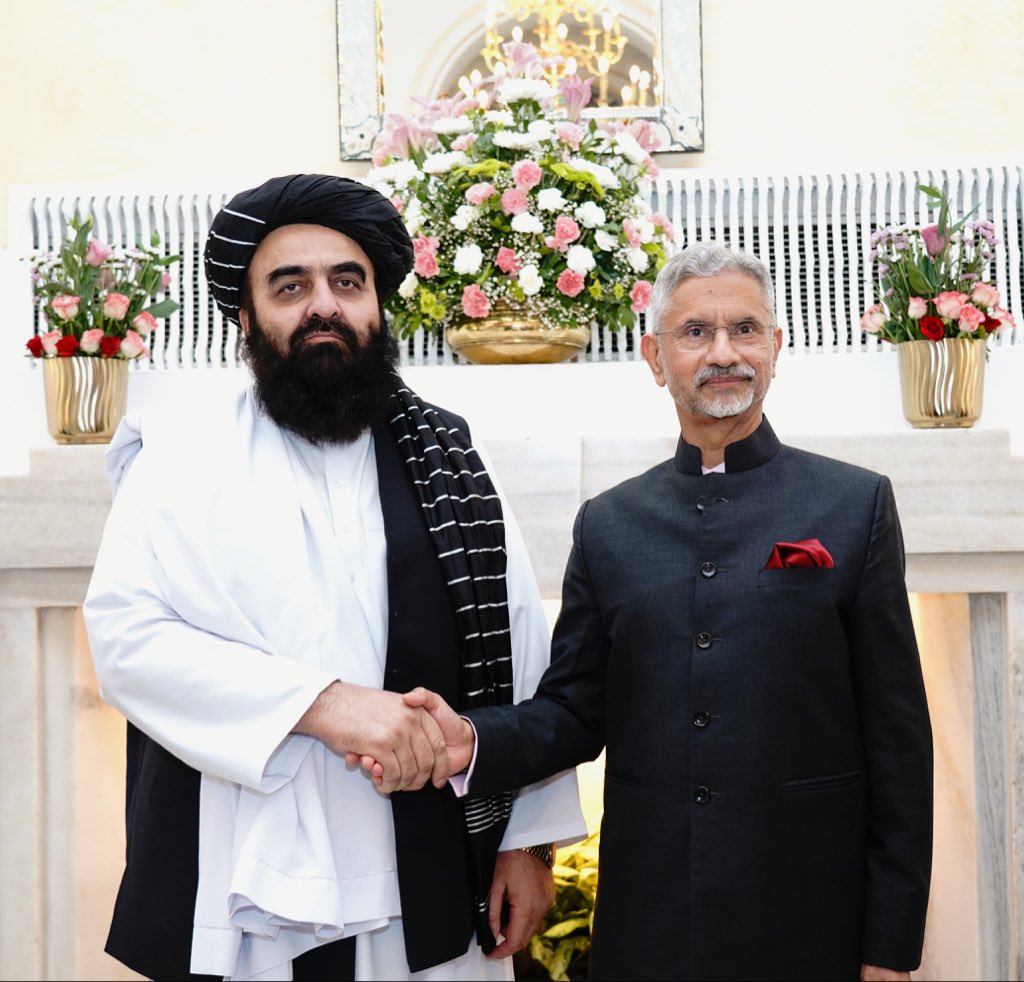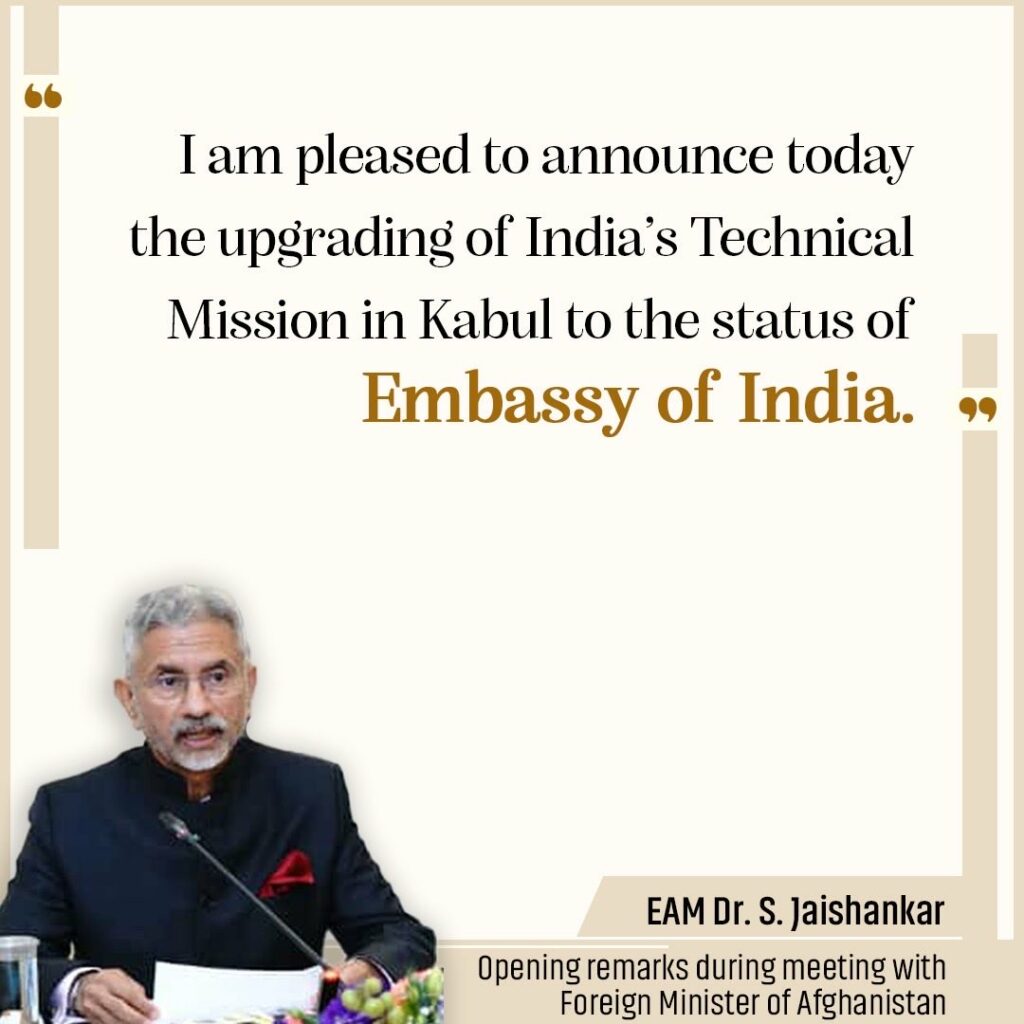
- The Afghan FM’s visit is not only important for trade, investment, infrastructure, and security, but also because it comes at a time when relations between Pakistan and Afghanistan are strained.
- India has joined Russia and China in opposing Trump’s bid to reclaim the Bagram Air Base, a move that reflects New Delhi’s evolving and assertive foreign policy stance.
- Upgrading of India’s Technical Mission in Kabul to the status of a full-fledged Embassy marks a significant shift in India’s long-standing foreign policy approach, from cautious observation to confident assertion.
Afghan Foreign Minister Mawlawi Amir Khan Muttaqi is on a five-day visit to India. Before arriving, he participated in the 7th Moscow Format Consultations on Afghanistan, which included India, Afghanistan, Russia, China, Iran, and the Central Asian countries, including Pakistan.
During the consultations, India joined other member nations in rejecting any attempt to redeploy foreign troops in Afghanistan, responding to U.S. President Donald Trump’s call for reclaiming the Bagram Air Base. Muttaqi’s visit has therefore raised and might also answer important questions about how India’s relationship with the Taliban-led regime has evolved over the past four years.
India’s Evolving Stance Toward the Taliban
When the Taliban took power in Afghanistan following the regime change, India’s initial reaction was cautious and far from positive. However, relations have gradually improved over time, even though India did not officially recognise the Taliban government and had not allowed the Taliban flag to be displayed at the Afghan Embassy in New Delhi. This visit has thus provided an opportunity for both countries to mend ties for the benefit of both.
Suhail Shaheen, Afghanistan’s ambassador to Qatar, reflected this sentiment when speaking to the media. He said, “Afghanistan and India want to have a good relationship, to expand relations. So they should remove the obstacle of recognition.”
Consequently, during the meeting with Afghanistan’s Foreign Minister, EAM Dr S Jaishankar reaffirmed India’s enduring commitment to Afghanistan’s stability and development. Underscoring New Delhi’s continued humanitarian and developmental assistance, from healthcare support and food aid to infrastructure reconstruction. Most importantly, the EAM announced the upgrading of India’s Technical Mission in Kabul to the status of a full-fledged Embassy. This step, he noted, reflects India’s confidence in the bilateral relationship and its intent to strengthen diplomatic engagement, facilitate projects, and ensure closer coordination on issues of mutual concern, including counter-terrorism and regional stability.
Hence, this meeting is crucial not only from India’s Afghanistan perspective, which involves trade, investment, infrastructure projects, and security concerns, but also because it comes at a time when relations between Pakistan and Afghanistan are strained. The recent attacks along the Afghan-Pak border have opened a window for India to strengthen its engagement with Kabul.

India Opposes the US’s Bagaram Claim
Furthermore, India, along with Russia and China has has also opposed Trump’s bid to reclaim the Bagram Air Base, a move that reflects New Delhi’s evolving and assertive foreign policy stance. Four years after US forces evacuated their military bases in Afghanistan, Bagram remains a contentious piece of real estate that the Trump administration wants to retake from the Taliban. Trump told reporters, “If Afghanistan doesn’t give Bagram Airbase back to those that built it, the United States of America, BAD THINGS ARE GOING TO HAPPEN!!!”.
India is no longer remaining silent on key geopolitical issues. Following Trump’s decision to impose an extra 25% tariff on Indian oil imports from Russia, India has started speaking more firmly and asserting its diplomatic position on global platforms.
Conclusion: India’s Moment in a Changing Asian Order
The visit of the Afghan FM and upgrading of India’s Technical Mission in Kabul to the status of a full-fledged Embassy marks a significant shift in India’s long-standing foreign policy approach, from cautious observation to confident assertion. As the global order becomes increasingly multipolar, this is an opportune moment for India to demonstrate its strategic relevance and diplomatic capabilities. The current situation offers India an opportunity to turn challenges into leverage and establish itself as a decisive player in the evolving world order.
References:
- https://www.ndtv.com/opinion/why-the-taliban-foreign-minister-is-really-visiting-india-9417392
- https://www.wionews.com/world/afghanistan-s-taliban-led-government-hopes-india-will-recognise-them-says-key-official-1760026983154
- https://www.wionews.com/india-news/afghan-foreign-minister-amir-khan-muttaqi-reaches-delhi-1759977184688
- https://www.aljazeera.com/news/2025/9/29/afghanistans-bagram-airbase-why-is-trump-desperate-to-take-it-back
Garima Sharma is a Master’s student in International Relations at Jawaharlal Nehru University. Her interests include public policy, international governance, geopolitics, defence, and security. Views expressed are the author’s own.
